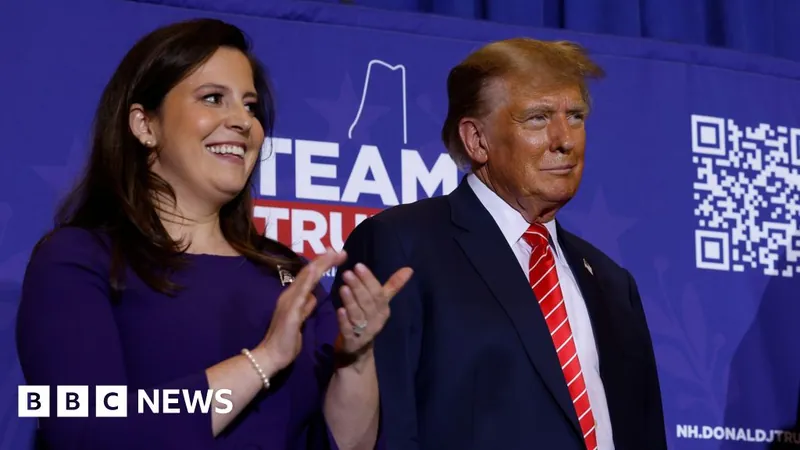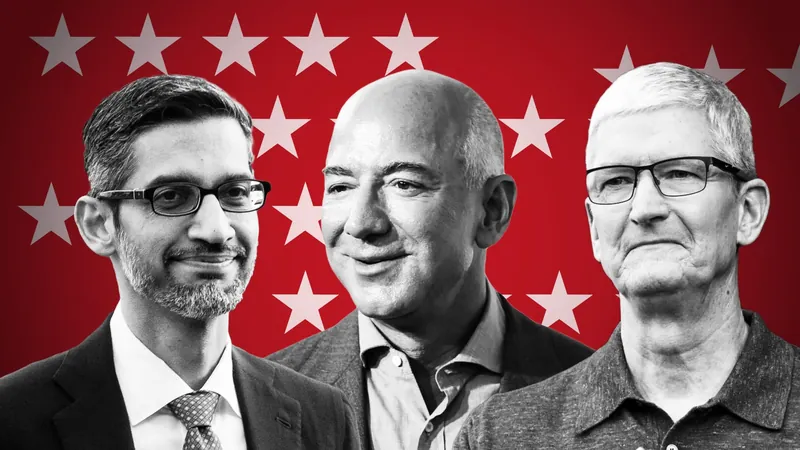
What Trump's Staffing Picks Reveal About His Second Term Vision
2024-11-13
Author: Charlotte
What Trump's Staffing Picks Reveal About His Second Term Vision
As Donald Trump prepares for a second term in the White House, the initial framework of his upcoming administration is coming into focus. With a week since his electoral victory, Trump has begun announcing key appointments that will shape his policy direction and priorities when he takes office this January.
A Tough Stance on Immigration
One of the most telling aspects of Trump's staffing choices is his commitment to a hardline immigration agenda. His selection of Stephen Miller, a close advisor and former speechwriter, as Deputy Chief of Staff for Policy suggests an intensified focus on immigration enforcement. Miller’s previous role in crafting some of Trump’s strictest immigration policies indicates that mass deportations could be a central theme of his second term.
Thomas Homan, back in a prominent role as "immigration tsar," has expressed a bold ambition to create an extensive deportation force. Critics warn that implementing such a plan could cost the U.S. economy over $300 billion. However, Trump has dismissed these concerns, stating that the safety and security of American citizens are worth any expenditure.
A Foreign Policy Pivot Toward China
Trump's foreign policy team reflects a staunch anti-China sentiment, with several key figures known for their skepticism toward Beijing. His selection of Congressman Mike Waltz as National Security Advisor signals a new chapter in U.S.-China relations, which have been fraught during his first term. With arguments that the U.S. is engaged in a "cold war" with China, Trump is likely to pursue an aggressive stance on trade and international diplomacy.
Elise Stefanik's appointment as UN Ambassador further underscores this shift, as she has publicly accused China of interference in U.S. elections. The anticipated choice for Secretary of State, Florida Senator Marco Rubio, has a history of advocating for punitive measures against China, especially concerning human rights abuses in Hong Kong. This trend suggests that Trump's administration will likely continue the confrontational approach seen in his first term.
Tech Influence and Government Efficiency
In a surprising twist, Trump has enlisted Elon Musk, the billionaire CEO of Tesla and SpaceX, to assist in streamlining government operations. Musk's direct involvement, including advice on cabinet nominees and a focus on government efficiency, signifies a blending of technology with politics. His political funding and close collaboration with Trump hint at a new era of governance marked by entrepreneurial influences.
Consolidating Presidential Power
Early actions by Trump indicate a desire to consolidate power within the executive branch. By promoting the use of “recess appointments” to fill government positions without Senate approval, Trump aims to bypass potential legislative gridlock. This strategy aligns with his goal of intensifying executive action over bipartisanship.
Trump’s focus on executive power may reflect lessons learned from his first term, where legislative cooperation often proved elusive. By prioritizing swift actions over collaboration, he sets the stage for an administration that values decisiveness.
Rewarding Loyalty Over Establishment Politics
One significant development in Trump's staffing choices is his inclination to reward loyal allies rather than rely on establishment figures. Appointments like South Dakota Governor Kristi Noem as Homeland Security Secretary and Fox News host Pete Hegseth as Defense Secretary exemplify this strategy. These individuals have been vocal supporters of Trump and represent a departure from more traditional Republican appointees.
However, the emphasis on loyalty raises questions about potential conflicts of interest and the balance of power within the administration. As Trump's second term unfolds, it remains to be seen whether his reliance on loyalists will yield the successful governance he seeks or create rifts within his team.
As Trump assembles his administration, the dynamics between immigration policies, foreign relations, and the consolidation of power will likely define his next four years in office. With voters, lawmakers, and critics watching closely, the path ahead promises to be as contentious as ever in American political history.
Stay tuned for updates as this story develops!









 Brasil (PT)
Brasil (PT)
 Canada (EN)
Canada (EN)
 Chile (ES)
Chile (ES)
 España (ES)
España (ES)
 France (FR)
France (FR)
 Hong Kong (EN)
Hong Kong (EN)
 Italia (IT)
Italia (IT)
 日本 (JA)
日本 (JA)
 Magyarország (HU)
Magyarország (HU)
 Norge (NO)
Norge (NO)
 Polska (PL)
Polska (PL)
 Schweiz (DE)
Schweiz (DE)
 Singapore (EN)
Singapore (EN)
 Sverige (SV)
Sverige (SV)
 Suomi (FI)
Suomi (FI)
 Türkiye (TR)
Türkiye (TR)